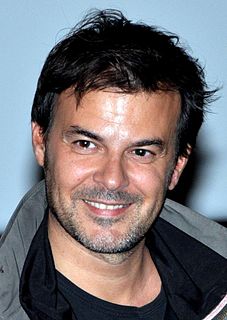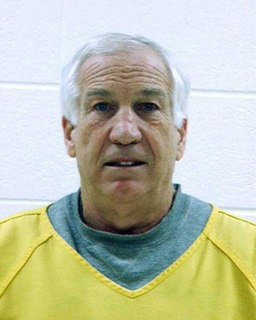A Quote by Francois Ozon
Speaking with many young people, they act like their virginity is something you have to turn the page very quickly on. "It's done."
Related Quotes
A book is something that young readers can experience on their own time. They decide when to turn the page. They'll put their arm right on the page so you can't turn it because they're not ready to go to the next page yet. They just want to look at it again, or they want to read the book over and over because they really enjoy setting the pace themselves.
In terms of - my relationship with so many, many young people. I would - I would guess that there are many young people who would come forward. Many more young people who would come forward and say that my methods and - and what I had done for them made a very positive impact on their life. And I didn't go around seeking out every young person for sexual needs that I've helped. There are many that I didn't have - I hardly had any contact with who I have helped in many, many ways.
The WWE has a massive outreach on social media, and our fanbase is very vocal. So many young people watch the WWE, and I can turn around and say: "This also happens to me. Daily." I've been regarded as a very "controversial" figure, but in a setting like this, where I talk to young people, it helps.
Yes, the fear of its blankness. At the same time, I kind of loved it. Mallarmé was trying to make the page a blank page. But if you're going to make the page a blank page, it's not just the absence of something, it has to become something else. It has to be material, it has to be this thing. I wanted to turn a page into a thing.
No one reads to hear someone complain about the weather or how poorly their children are behaving. You have to give the readers a reason to turn the page. As a writer you have to invite someone to turn the page. And that is a skill you have to refine. That is why you have to read. You have to read to learn what it is that makes people turn the page.
When you're reading a newspaper and you're seeing ads on the page, it's not kind of invasive. Like, it's on the page next to the article. You can look at it or not. You can turn the page when you're ready. On the internet, the ads - many of the ads - just are so controlling. They insist that you see them.
The only place where you can really surprise or shock the reader, or make someone laugh, is on the lower righthand corner - the very last panel - so as you turn the page, the payoff is in the upper lefthand panel. To pace every story so that there's a setup and a payoff at the page turn was a huge challenge; it's a part of the medium and you really have to learn what can be done in the medium.
If I'm very drunk, I can improvise. But generally speaking, no. Generally speaking, almost all of my work is material that was first done on the printed page. And the shorter ones that you might call poems, I had a stretch from '79, '80, for five or six years, where I wrote a lot of poetry as such. Simply because I was asked to.
When I was a TV director working on Judd Apatow's show Undeclared. I was surrounded by so many young people. People like Seth Rogen, who was 9 years old or something. It was just a ridiculous amount of talented young people. I started to think I'd like to see a young-love movie, but not one done in that glossy, Hollywood, high-concept manner we've become accustomed to. One that was, for lack of a better way of putting it, a little more ambiguous, '70s-style, where everyone was flawed, middle-class characters.
Boys are rarely told that their virginity is a gift, or indeed that their sexuality is about “giving” something to another person – lightly or not. Boys “get laid”, “get lucky”, “get some”. They “take a girl’s virginity”, “take advantage”; if they’re thoughtful, they “take their time”. Boys are not taught to think of themselves or their virginity as something to be offered up, unwrapped and enjoyed.





































